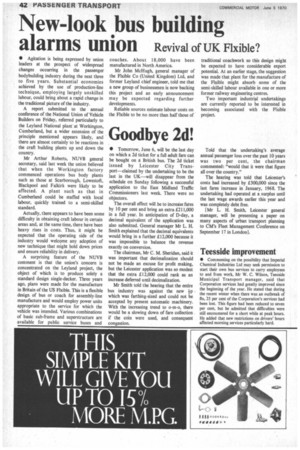New-look bus building
Page 44

If you've noticed an error in this article please click here to report it so we can fix it.
alarms union Revival of UK Flxible?
• Agitation is being expressed by union leaders at the prospect of widespread changes occurring in the passenger bodybuilding industry during the next three to five years. Substantial economies achieved by the use of production-line technique, employing largely unskilled labour, could bring about a rapid change in the traditional picture of the industry.
A report submitted to the annual conference of the National Union of Vehicle Builders on Friday, referred particularly to the Leyland National plant at Workington, Cumberland, but a wider extension of the principle mentioned appears likely, and there are almost certainly to be reactions in the craft building plants up and down the country.
Mr Arthur Roberts, NUVB general secretary, said last week the union believed that when the Workington factory commenced operations bus body plants such as those at Scarborough. Lowestoft, Blackpool and Falkirk were likely to be affected. A plant such as that in Cumberland could he staffed with local labour, quickly trained to a semi-skilled standard.
Actually, there appears to have been some difficulty in obtaining craft labour in certain areas and. at the same time, there have been heavy rises in costs. Thus, it might be expected that the operating side of the industry would welcome any adoption of new technique that might hold down prices and ensure reliability in delivery.
A surprising feature of the NUVB comment is that the union's concern is concentrated on the Leyland project, the object of which is to produce solely a standard design single-decker. Three years ago, plans were made for the manufacture in Britain of the US Flxible. This is a flexible design of bus or coach for assembly-line manufacture and would employ power units appropriate to the service for which the vehicle was intended. Various combinations of basic sub-frame and superstructure are available for public service buses and coaches. About 18,000 have been manufactured in North America.
Mr John McHugh, general manager of the Flxible Co (United Kingdom) Ltd, and former Leyland chief engineer, told me that a new group of businessmen is now backing this project and an early announcement may be expected regarding further developments.
Reliable sources estimate labour costs on the Flxible to be no more than half those of traditional coachwork so this design might be expected to have considerable export potential. At an earlier stage, the suggestion was made that plant for the manufacture of the Flxible might absorb some of the semi-skilled labour available in one or more former railway engineering centres.
Two important industrial undertakings are currently reported to be interested in becoming associated with the Flxible project.




























































































































































































